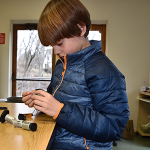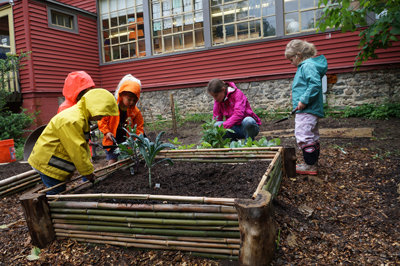Science
Our science curriculum is an adaptable and evolving resource focused on using the scientific process to help students better understand their world. It provides a scaffold for learning experiences while remaining flexible enough to incorporate student interests, new opportunities, and emerging ideas in science education. Its current stage of development is heavily influenced by a variety of sources. These include Miquon’s environment and rich traditions, current research on science literacy, progressive education practices, student interests and the wisdom of our experienced staff.
View The Science Curriculum Scope and Sequence, which uses specific terminology from Project 2061: Benchmarks for Science Literacy, the Pennsylvania Department of Education Standards, and the NYC Department of Education has been used to describe key ideas already in place.
Dear Friends -- Please be aware that Miquon is receiving comments on its social media posts by entities/bots claiming to sell Miquon branded gear. These sales are not authorized by the school and we are working to stop the activity. In the meantime, please do not make any purchases through our social media. If you are interested in buying Miquon gear, you can contact communications@miquon.org. Thank you!

Some of our 1st and 2nd graders are working on the SEL skill of compromise. Teachers are incorporating skits, group games, journal prompts, and readings to focus them on two ways to compromise: mix ideas together in an “Idea Pot” and/or balance the scales of fun by taking turns. They practiced by using these skills to negotiate disagreements, like whether to play tag or build forts, make mud cakes or fairy houses.

New research concludes that play-based learning can have a greater positive effect on the acquisition of skills like math, shape knowledge, and task switching than more traditional approaches that prioritize seat time and explicit instruction. Click the link in our bio to read the article. #playbasedlearning #joyinlearning #childhoodshouldbefun

Some weeks in kindergarten are magical and last week was one of them! They celebrated the 100th day of school, practiced counting and letters, made maple syrup AND their own pancake batter, and worked together in the sandbox to create a sturdy cave, a strong bridge, and many paths for water to flow! #childrenlearnbydoing #themiquonschool

Approach
To support the development of curious, life long learners, Miquon students actively experiment to better understand the world. The science program emphasizes critical thinking processes that give children the skills they need to explore their own questions.
These essential questions guide the development of worthwhile experiences for Nursery through 6th Grade students:
- How can we observe, question and experiment to better understand our world?
- What lives, grows and breaks down at Miquon?
- How do parts of a system affect each other?
- How can we create what we need or want?
- How does science work? How does science information change over time?
Specific areas of study are selected through the interplay of a variety of factors (including, but not limited to): personal relevance to students’ daily lives, local and global events, the availability of resources, and student and teacher interests. The disciplines of biology, chemistry, physics, ecology, engineering, and art are woven throughout the curriculum. Core ideas in these fields are investigated and revisited in age appropriate ways to build the foundation for a broad and nuanced knowledgebase.
The Art and Science Show
 The Art and Science Show is an event in the spring that showcases work from every child in the school. The art presentation is curated by the students and the art specialist teacher. The science show has had a variety of iterations over the last few years, but it always features reflective learning exhibitions from fifth and sixth grade students. These exhibitions may feature inventions developed by students, extensions of science projects completed earlier in the year, live demonstrations, or creative exhibits that educate visitors about a specific topic. Younger students are also invited to present their projects and inventions, but it is not mandatory.
The Art and Science Show is an event in the spring that showcases work from every child in the school. The art presentation is curated by the students and the art specialist teacher. The science show has had a variety of iterations over the last few years, but it always features reflective learning exhibitions from fifth and sixth grade students. These exhibitions may feature inventions developed by students, extensions of science projects completed earlier in the year, live demonstrations, or creative exhibits that educate visitors about a specific topic. Younger students are also invited to present their projects and inventions, but it is not mandatory.
Science Choice
In addition to scheduled classes, many children also enjoy visiting the science room at lunch choice. The science room is open two to three days a week. Students visit to continue projects from class, build new creations, work with computer programs, read books and spend time with the live animal visitors.
Minicourses
Minicourses are elective courses for children held for an hour on Friday mornings in eight week installments. Topics for these courses may be suggested by teachers or children. Some science related minicourses held over the last few years include: SCRATCH-an introduction to computer programming created by MIT, Google Sites, Woodworking, Art and Sculpture in Nature, Baking Bread, Move It–a dance and fitness class, Bird Watching and Hiking, Paper Airplane Design, Building Things That Go, and Chemistry & Crystals.
Science Blog
Want to learn more about the latest with Science Kate? Check out pictures, kid projects and the other happenings posted to the Science Blog.
Curriculum Report
The curriculum report is the teachers’ review of the entire year, looking back and making observations after their plans, projects, problems, and revelations are long over. One of the distinguishing features of this report is the great extent to which each teacher’s style, focus, and personality come through in this retrospective narrative. Check out the Science Curriculum Report.
